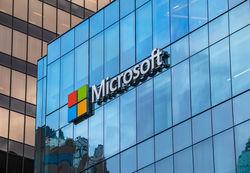
Amid persistently high inflation, aggressive interest rate hikes, and a potential economic slowdown, cash-rich companies like Microsoft Corporation (MSFT) are witnessing huge investor interest. MSFT’s strong cash position allows it to advance organic growth, pursue strategic acquisitions, pay dividends, and buy back shares.
The tech giant had cash and cash equivalents of $22.88 billion as of September 30, 2022, compared to $13.93 billion as of June 30, 2022. The company had current liabilities of $87.39 billion as of September 30 versus $95.08 billion as of June 30.
On September 20, MSFT declared a quarterly dividend of $0.68 per share, reflecting a 10% increase over the prior quarter’s dividend. The dividend is payable on December 8, 2022.
The company pays a $2.72 dividend annually, yielding 1.15% at the current share price. Its 4-year average dividend yield is 1.07%. Its dividend payouts have grown at a CAGR of 10.5% over the past three years and 9.7% over the past five years. Moreover, the company has increased its dividends over the past 17 years.
Furthermore, MSFT has landed profitable long-term deals with leading market players. On October 20, MSFT and UBS Group AG (UBS) announced a landmark expansion of their partnership to accelerate UBS’s public cloud footprint over the next five years. MSFT’s rich set of productivity and collaboration tools would enable UBS to increase the speed at which it can deliver and improve upon its digital experiences for clients and employees.
On October 12, MSFT and Cisco Systems, Inc. (CSCO) announced a new partnership to provide customers with more choices. In the first half of 2023, CSCO and MSFT will offer the ability to run Microsoft Teams natively on Cisco Room and Desk devices Certified for Microsoft Teams, with Teams as the default experience option. This is expected to broaden the reach of MSFT’s suite of productivity and collaboration tools.
MSFT has gained marginally over the past month to close the last trading session at $235.87. Moreover, Wall Street analysts expect the stock to hit $297.19 in the near term, indicating a potential upside of 26%.
Here is what could influence MSFT’s performance in the upcoming months:
Robust Financials
For the fiscal 2023 first quarter ended September 30, 2022, MSFT’s total revenue increased 10.6% year-over-year to $50.12 billion, driven by growth in Intelligent Cloud and Productivity and Business Processes segments. Its operating income grew 6.3% from the year-ago value to $21.52 billion.
Furthermore, the company’s adjusted net income and earnings per share came in at $17.56 billion and $2.35, representing increases of 2% and 4% year-over-year, respectively.
Favorable Analyst Estimates
Analysts expect MSFT’s revenue for the fiscal 2023 third quarter (ending March 2023) to come in at $52.72 billion, indicating an increase of 6.8% year-over-year. The current year’s consensus EPS estimate of $2.35 indicates a 5.7% year-over-year increase. The company has surpassed the consensus revenue and EPS estimates in three of the trailing four quarters, which is impressive.
In addition, the consensus revenue and EPS estimate of $212.37 billion and $9.53 for the current fiscal year (ending June 2023) represents 7.1% and 3.4% year-over-year increases, respectively. Also, the company’s revenue and EPS for fiscal 2024 are expected to increase 14.4% and 11.3% year-over-year to $242.97 billion and $11.29, respectively.
Higher-than-industry Profitability
In terms of the trailing-12-month gross profit margin, MSFT’s 68.26% is 35.6% higher than the 50.33% industry average. Its trailing-12-month EBIT margin of 41.69% is 489.3% higher than the industry average of 7.07%. Likewise, its 48.67% trailing-12-month EBITDA margin is 299.6% higher than the industry average of 12.18%.
Furthermore, the stock’s trailing-12-month ROCE, ROTC, and ROTA of 42.88%, 21.97%, and 19.40% compare to the industry averages of 6.63%, 3.73%, and 2.22%, respectively. Its trailing-12-month CAPEX/Sales of 12% is 423.5% higher than the industry average of 2.29%.
POWR Ratings Show Promise
MSFT has an overall rating of B, equating to a Buy in our POWR Ratings system. The POWR Ratings are calculated by considering 118 different factors, each weighted to an optimal degree.
Our proprietary rating system also evaluates each stock based on eight distinct categories. The stock has a B grade for Quality, in sync with its higher-than-industry profitability.
MSFT is ranked #10 out of 52 stocks in the B-rated Software – Business industry. Click here to access MSFT’s Growth, Value, Sentiment, Stability, and Momentum.
Bottom Line
MSFT’s revenue and net income have increased at CAGRs of 16.1% and 19.3% over the past three years, respectively. Moreover, the company’s levered free cash flow has grown at a CAGR of 10.9% over the past three years. Its balance sheet seems rock solid, with cash outweighing its liabilities. The tech giant also raised its quarterly dividend by 10%.
Given its robust financials, solid analyst estimates, and high profitability, we think it could be wise to buy this cash-rich stock and hold it forever.
How Does Microsoft Corporation (MSFT) Stack Up Against its Peers?
MSFT has an overall POWR Rating of B, equating to a Buy. Check out these other stocks within the Software – Business industry with an A (Strong Buy) or B (Buy) rating: VMware Inc. (VMW), Amdocs Limited (DOX), and Agilysys, Inc. (AGYS).
MSFT shares fell $2.26 (-0.96%) in premarket trading Monday. Year-to-date, MSFT has declined -29.41%, versus a -17.15% rise in the benchmark S&P 500 index during the same period.
About the Author: Mangeet Kaur Bouns

Mangeet’s keen interest in the stock market led her to become an investment researcher and financial journalist. Using her fundamental approach to analyzing stocks, Mangeet’s looks to help retail investors understand the underlying factors before making investment decisions.
1 Cash-Rich Stock You Can Buy Now and Hold Forever StockNews.com






